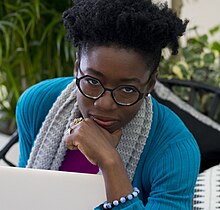Invited speakers

In chronological order, the invited speakers for Wikimania 2018 are:
- Martin Dittus - Friday afternoon
- Sean Jacobs - Saturday morning
- Katherine Maher - Saturday afternoon
- Joy Buolamwini - Sunday morning

Martin Dittus
Creating Knowledge Equity and Spatial Justice on Wikipedia
Speaker: Dr Martin Dittus, Oxford Internet Institute
Date: Friday, 20th July. Time: 17:00 Location: Montreal ![]() & Mexico City
& Mexico City ![]()
![]() LIVE STREAM
LIVE STREAM

The world is increasingly digital. Places are layered with data and algorithms that fundamentally shape our geographic interactions, impacting how we perceive, move through, and use the cities that we live in. As the world's largest web-based encyclopaedia, Wikipedia plays an enormous role in shaping how people relate to the world. But while the open nature of Wikipedia, in theory, allows content to be created by anyone about any notable place, there remain significant imbalances in global participation and representation.
In response, the Wikipedia community has introduced the concept of "knowledge equity" as an important strategic concern: "We will strive to counteract structural inequalities to ensure a just representation of knowledge and people in the Wikimedia movement."
To better understand the effects of this transformation, it becomes important to ask who owns, controls, shapes, and has access to those augmented and hybrid digital/physical layers of place. Now that over half of humanity is connected to the internet, do we see greater levels of representation of, and participation from, previously digitally disconnected populations? Or are our digitally dense environments continuing to amplify inequalities rather than alleviate them?
Professor Mark Graham and Dr Martin Dittus have recently launched a two-year project to empirically address those questions about our information geographies. Martin will present early findings, using geotagged information found on Wikipedia. What are the geographies of digital augmentations of place? And what is the provenance of those digital augmentations? Are we seeing a widening or narrowing of informational inequalities? By presenting our theoretical framework, methodology, and preliminary results, we hope to both bring a spatial perspective to emergent conversations about knowledge equity on Wikipedia, and receive feedback that could reshape our empirical enquiry in this multi-year project.
Biography
Martin Dittus is a digital geographer and data scientist at the Oxford Internet Institute, with a focus on mass-participation platforms and social computing. In his research he analyses and visualises emerging online practices at large scale. Together with Mark Graham he is currently researching the information geography of Wikipedia. Which places in the world are represented on Wikipedia, and who in the world participates in the creation of this knowledge? How equitable are the processes that shape this knowledge? Who, what, and where gets left out?
Sean Jacobs
The Decolonizing Debate: Social Media as Source Archive and Wikipedia
Speaker: Dr. Sean Jacobs, The New School
Date: Saturday, 21th July. Time: 09:00 Location: Montreal ![]() & Mexico City
& Mexico City ![]()
![]() LIVE STREAM
LIVE STREAM

With debates over expanding the limits over what is considered Wikipedia's knowledge sources, my talk will explore what lessons we can gain from recent political developments in the host country, i.e. the decolonizing movement, and more generally debates within academia over the internet, especially social media, as source archive.
Biography
Sean Jacobs, a native of Cape Town, is associate professor of international affairs at The New School in New York City. He is also founder and editor of Africa is a Country, a site of criticism, analysis and new writing. He is currently a Ford Foundation #AfricaNoFilter Fellow.
Katherine Maher
Speaker: Katherine Maher, Executive Director, Wikimedia Foundation
Date: Saturday, 21th July. Time: 16:00 Location: Montreal ![]() & Mexico City
& Mexico City ![]()
![]() LIVE STREAM
LIVE STREAM

Katherine Maher is the Executive Director of the Wikimedia Foundation, the nonprofit organization that supports Wikipedia and its sister projects. She is a longtime advocate for free and open societies, and an expert in leveraging technology for social impact. Katherine was appointed Executive Director in July 2016, after serving as the organization’s first Chief Communications Officer. She has lived and worked around the world, leading the introduction of technology and innovation in human rights, good governance, and international development. She was a founding member of the UNICEF Innovation team, where she helped introduce open source innovation for health and child welfare. She has worked with the National Democratic Institute, the World Bank, and Access Now on programs supporting innovative technologies for democratic participation, civic engagement, youth entrepreneurship, open government, and human rights. Katherine is a member of the World Economic Forum’s Global Council on Human Rights, a fellow at the Truman National Security Project, a member of the advisory board of the Open Technology Fund and a trustee of the Project for the Study of the 21st Century. She lives in San Francisco.
Joy Buolamwini
The Dangers of Supremely White Data and The Coded Gaze
Speaker: Joy Buolamwini, MIT Media Lab
Date: Sunday, 22nd July. Time: 09:00 Location: Montreal ![]() & Mexico City
& Mexico City ![]()
![]() LIVE STREAM
LIVE STREAM

Biography
Joy Buolamwini is a poet of code who uses art and research to illuminate the social implications of artificial intelligence. She founded the Algorithmic Justice League to fight the coded gaze -bias in AI. At the MIT Media Lab, she pioneered techniques that are now leading to increased transparency in the use of facial analysis technology globally. She leads the IEEE working group to create the first international standards for facial analysis technology. Her TED Talk on algorithmic bias has been viewed over 1 million times. More than 230 articles in over 37 countries have been written about her Gender Shades thesis work which uncovered large accuracy disparities in commercial AI services. Buolamwini is a Rhodes Scholar, Fulbright Fellow, and Google Anita Borg Scholar. She holds master's degrees from Oxford University and MIT and a bachelor's degree in Computer Science from the Georgia Institute of Technology. She is pursuing a PhD at MIT aimed at participatory artificial intelligence.
